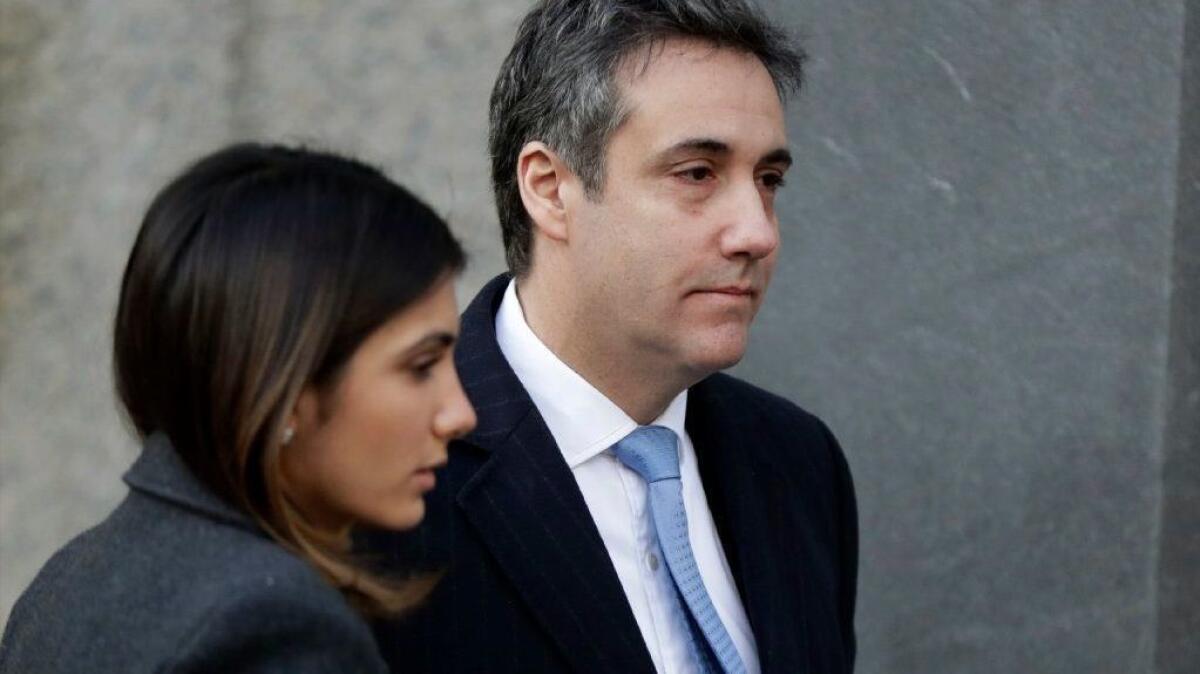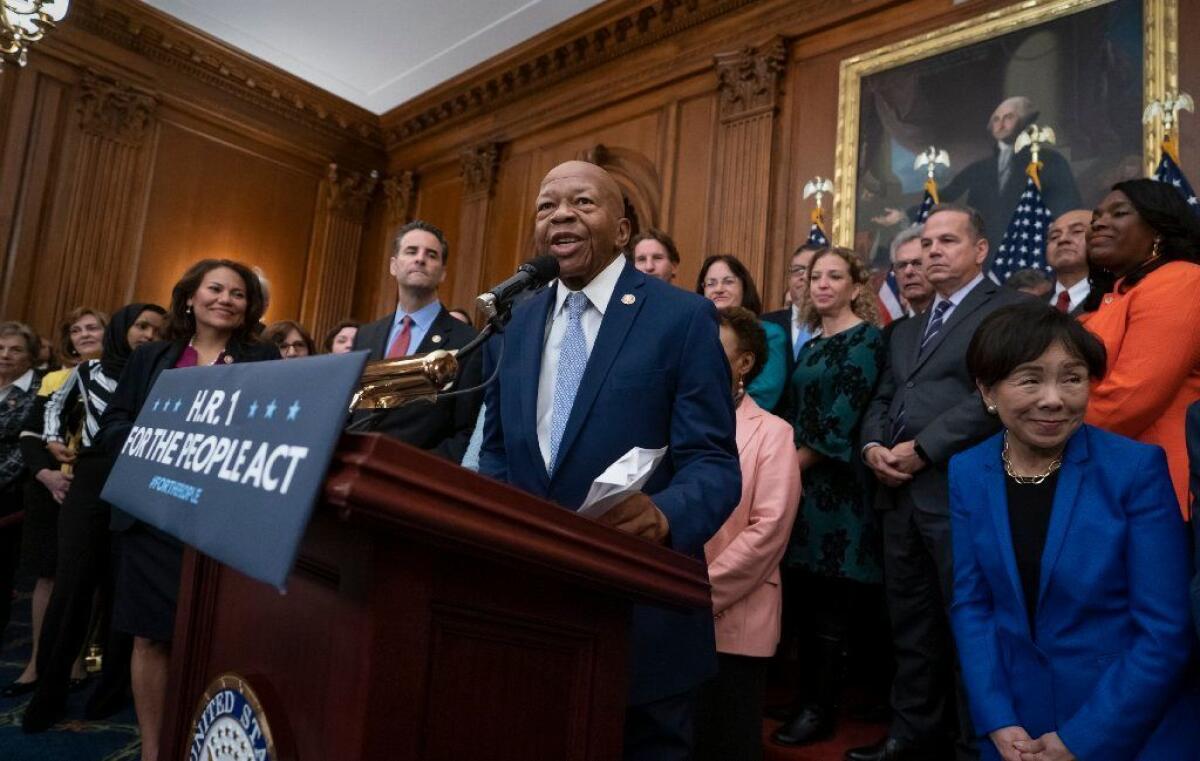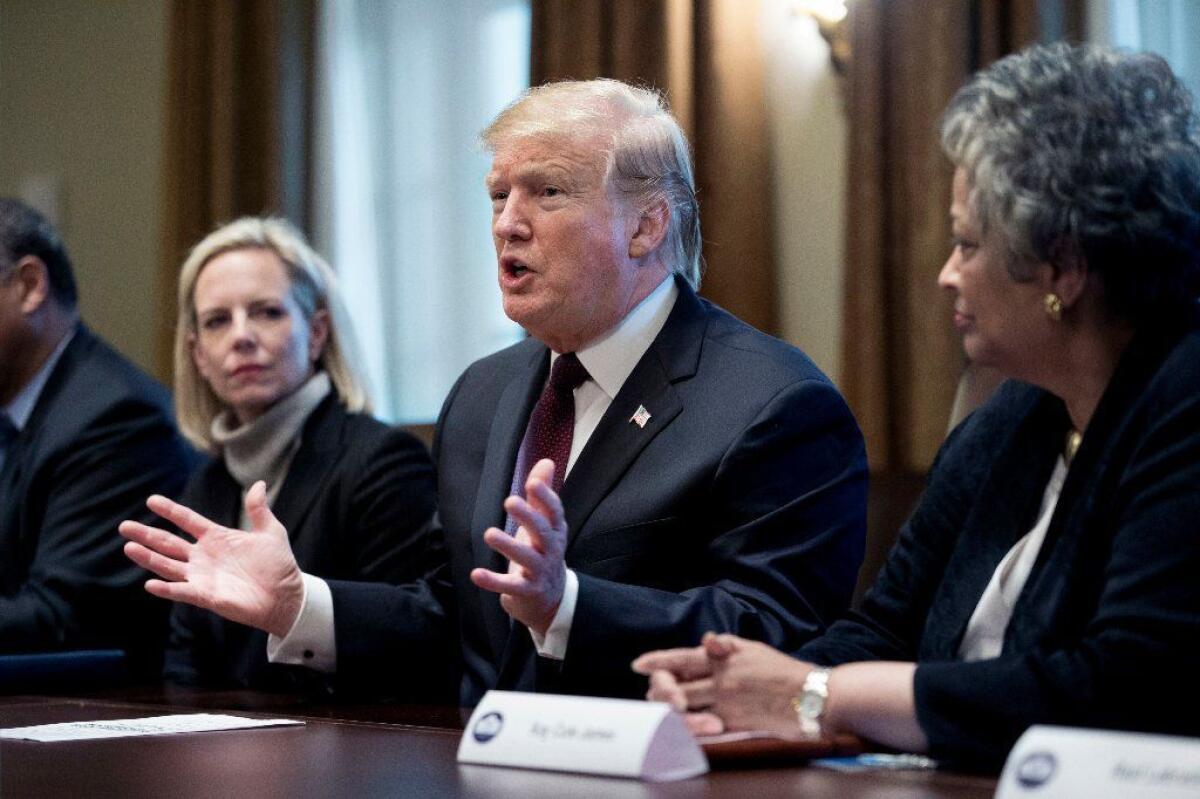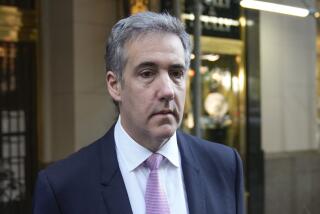Michael Cohen delays congressional testimony, citing threats from President Trump

- Share via
Reporting from Washington — President Trump’s former lawyer, Michael Cohen, postponed his scheduled appearance on Capitol Hill, citing “ongoing threats” from Trump and spurring Democrats to suggest they might issue a subpoena to force his hotly anticipated testimony.
A subpoena would aggressively signal Democrats’ intention to investigate the president and his inner circle. It could also, however, put them at cross purposes with federal prosecutors, who have relied on Cohen as a witness and may want to restrict his public testimony.
Cohen’s announcement Wednesday came in a statement by his spokesman, Lanny Davis. It said Cohen, who has been at the center of criminal investigations involving the president, was withdrawing from a Feb. 7 hearing of the House Oversight Committee over threats from Trump and the president’s lawyer, Rudolph W. Giuliani, the former New York mayor.
“This is a time where Mr. Cohen had to put his family and their safety first,” Davis said.
Davis also said Cohen’s lawyers urged a delay because of his “continued cooperation with ongoing investigations.” Cohen “looks forward to testifying at the appropriate time,” Davis added.
Trump brushed off the suggestion that he had threatened Cohen.
“He’s only been threatened by the truth,” he told reporters at the White House.
Since Cohen’s congressional appearance was announced this month, Trump and his allies have repeatedly insulted him as a liar and claimed he was covering up criminal activity by his father-in-law, Fima Shusterman, who immigrated to the U.S. from Ukraine.
Giuliani said in a recent CNN appearance that Shusterman may have ties to organized crime and Cohen was afraid to testify against him. He did not offer evidence to back that accusation, and Shusterman has not been charged with any crime.

Democrats accused the president of interfering with a congressional investigation.
“Any kind of intimidation is unacceptable,” Rep. Elijah E. Cummings (D-Md.), chairman of the House Oversight Committee, told reporters on Capitol Hill. “Any kind of threats are unacceptable. We simply will not have it.”
Cohen is scheduled to start his three-year prison sentence for various crimes, some involving Trump, on March 6. However, Cummings said his committee could have U.S. marshals bring Cohen to Congress for his testimony.
Cummings would not say whether Cohen would face a subpoena, but several Democrats said they would support one if necessary.
“I do believe the president has created a climate of intimidation,” said Rep. Gerald E. Connolly (D-Va.), a member of the Oversight Committee. “I don’t think the president has directly threatened him, but I think he has enabled a very toxic climate that can affect people like Michael Cohen.”
In addition to Democrats’ push for Cohen to testify publicly, the House Intelligence Committee also wants to interview him behind closed doors.
“We’ve given Michael Cohen a date that we’d like him to come in either voluntarily or, if necessary, by subpoena,” Rep. Adam B. Schiff (D-Burbank), the panel’s chairman, told CBS on Sunday.
Wednesday’s controversy added another layer of drama to Cohen’s saga, which has seen him transform from one of Trump’s most passionate defenders to one of his greatest threats. He’s said that “blind loyalty” to Trump led him down a dark path, and he appeared eager to share his story.
“Time and time again I felt it was my duty to cover up his dirty deeds,” Cohen said in court at his sentencing hearing in December, referring to Trump.
He has pleaded guilty to nine crimes, including campaign finance violations for arranging election-year hush-money payments to women who said they had affairs with Trump years ago. Federal prosecutors in Manhattan, who have been handling the case, said Trump ordered the illegal scheme.

Cohen also admitted to lying to Congress about his pursuit of a Trump Tower Moscow project during the presidential campaign. He has been cooperating with the Russia investigation led by special counsel Robert S. Mueller III.
BuzzFeed News recently reported that Trump ordered Cohen to lie to Congress, an allegation denied by the president’s legal team. Mueller’s spokesman, Peter Carr, also released a rare statement saying the BuzzFeed report did not accurately reflect evidence collected by the special counsel’s office.
It’s unlikely that lawmakers would have the chance to question Cohen about that allegation. Davis said Cohen did not want to answer questions about issues involving the Russia investigation, and Democrats have said they do not want to interfere with Mueller’s inquiry.
Trump has repeatedly said that Cohen lied about him in hopes of getting a reduced sentence. More recently, in the aftermath of the announcement that his former aide would testify publicly, he’s suggested that Cohen’s father-in-law should be investigated.
“Watch father-in-law!” he tweeted last week.
Trump told Fox News on Jan. 12 that Cohen was lying about him to get a reduced sentence.
“But he should give information maybe on his father-in-law, because that’s the one that people want to look at,” he said.
At the time, top Democrats issued a joint statement warning about the president’s comments.
“Our nation’s laws prohibit efforts to discourage, intimidate or otherwise pressure a witness not to provide testimony to Congress,” said Cummings, Schiff and Rep. Jerrold Nadler (D-N.Y.), chairman of the House Judiciary Committee.
Giuliani said Trump’s comments did not represent an attempt to obstruct a congressional investigation.
“It’s defending yourself,” he said on CNN.
Times staff writers Sarah D. Wire and Jennifer Haberkorn contributed to this report.
More to Read
Get the L.A. Times Politics newsletter
Deeply reported insights into legislation, politics and policy from Sacramento, Washington and beyond. In your inbox three times per week.
You may occasionally receive promotional content from the Los Angeles Times.











